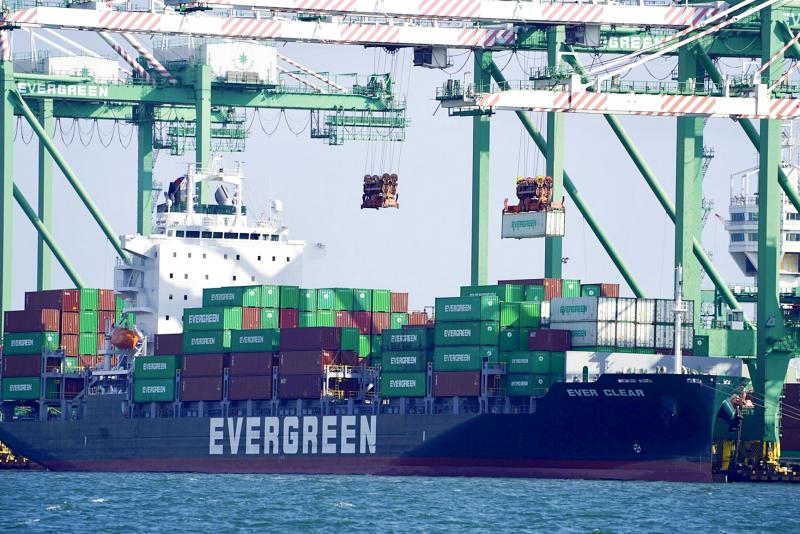Exports last month surged 38.7 percent year-on-year to US$34.96 billion, the second-highest value in history, as local firms benefited from an across-the-board increase in demand, the Ministry of Finance said yesterday.
A pickup in economic activity around the world also lent support to inventory building for tech and non-tech products, pushing up their selling prices, during a historically slow season, Department of Statistics Director-General Beatrice Tsai (蔡美娜) told a news conference in Taipei.
“Exports could stay above the US$30 billion mark for this month, or an increase of 25 to 31 percent from a year earlier,” Tsai said, adding that material, component and capacity shortages could persist until next year, based on the guidance of major tech firms.

Photo: CNA
Taiwan is home to the world’s leading contract makers of electronics used in smartphones, personal computers, TVs, vehicles, as well as artificial intelligence and Internet of Things applications. The second quarter is usually a low season for technology brands to digest inventory before the launch of next-generation products in the fall.
Shipments of electronics spiked 38.6 percent to US$13.51 billion, propelled by a 34.9 percent increase in semiconductors, a 44.1 percent bump in LEDs, a 35.2 percent pickup in capacitors and a 10.6 percent growth in printed circuit boards, the ministry’s report showed.
Exports of information and communications technology devices expanded 35.9 percent to US$4.71 billion on the back of demand for personal computers and accessories, data storage devices, routers, switches and related products, it said.
The COVID-19 pandemic has accelerated the digital transformation of companies and organizations, while 5G wireless communication and other new technologies are gaining momentum, Tsai said.
The boom extended to non-tech sectors, with chemicals, minerals, textiles, base metals and plastics reporting sweeping comebacks, with growth ranging from 27 percent to 128.8 percent, the ministry said.
Shipments of transportation tools grew 68.5 percent, while electrical products soared 33.1 percent, it added.
Warming global economic activities and a low base last year accounted for the impressive showings, it said.
Meanwhile, imports jumped 26.4 percent to US$28.79 billion, the ministry said.
Imports of capital equipment rose 39.2 percent from a year earlier, while industrial and agricultural raw materials saw an advance of 27.7 percent, it said.
The latest trade figures gave Taiwan a trade surplus of US$6.18 billion, more than doubling the year-ago level, it said.
For the first four months of the year, exports increased 28 percent to US$132.91 billion, while imports expanded 22.4 percent to US$112.36 billion, it said.

KEEPING UP: The acquisition of a cleanroom in Taiwan would enable Micron to increase production in a market where demand continues to outpace supply, a Micron official said Micron Technology Inc has signed a letter of intent to buy a fabrication site in Taiwan from Powerchip Semiconductor Manufacturing Corp (力積電) for US$1.8 billion to expand its production of memory chips. Micron would take control of the P5 site in Miaoli County’s Tongluo Township (銅鑼) and plans to ramp up DRAM production in phases after the transaction closes in the second quarter, the company said in a statement on Saturday. The acquisition includes an existing 12 inch fab cleanroom of 27,871m2 and would further position Micron to address growing global demand for memory solutions, the company said. Micron expects the transaction to

Nvidia Corp’s GB300 platform is expected to account for 70 to 80 percent of global artificial intelligence (AI) server rack shipments this year, while adoption of its next-generation Vera Rubin 200 platform is to gradually gain momentum after the third quarter of the year, TrendForce Corp (集邦科技) said. Servers based on Nvidia’s GB300 chips entered mass production last quarter and they are expected to become the mainstay models for Taiwanese server manufacturers this year, Trendforce analyst Frank Kung (龔明德) said in an interview. This year is expected to be a breakout year for AI servers based on a variety of chips, as

Global semiconductor stocks advanced yesterday, as comments by Nvidia Corp chief executive officer Jensen Huang (黃仁勳) at Davos, Switzerland, helped reinforce investor enthusiasm for artificial intelligence (AI). Samsung Electronics Co gained as much as 5 percent to an all-time high, helping drive South Korea’s benchmark KOSPI above 5,000 for the first time. That came after the Philadelphia Semiconductor Index rose more than 3 percent to a fresh record on Wednesday, with a boost from Nvidia. The gains came amid broad risk-on trade after US President Donald Trump withdrew his threat of tariffs on some European nations over backing for Greenland. Huang further

HSBC Bank Taiwan Ltd (匯豐台灣商銀) and the Taiwan High Prosecutors Office recently signed a memorandum of understanding (MOU) to enhance cooperation on the suspicious transaction analysis mechanism. This landmark agreement makes HSBC the first foreign bank in Taiwan to establish such a partnership with the High Prosecutors Office, underscoring its commitment to active anti-fraud initiatives, financial inclusion, and the “Treating Customers Fairly” principle. Through this deep public-private collaboration, both parties aim to co-create a secure financial ecosystem via early warning detection and precise fraud prevention technologies. At the signing ceremony, HSBC Taiwan CEO and head of banking Adam Chen (陳志堅)